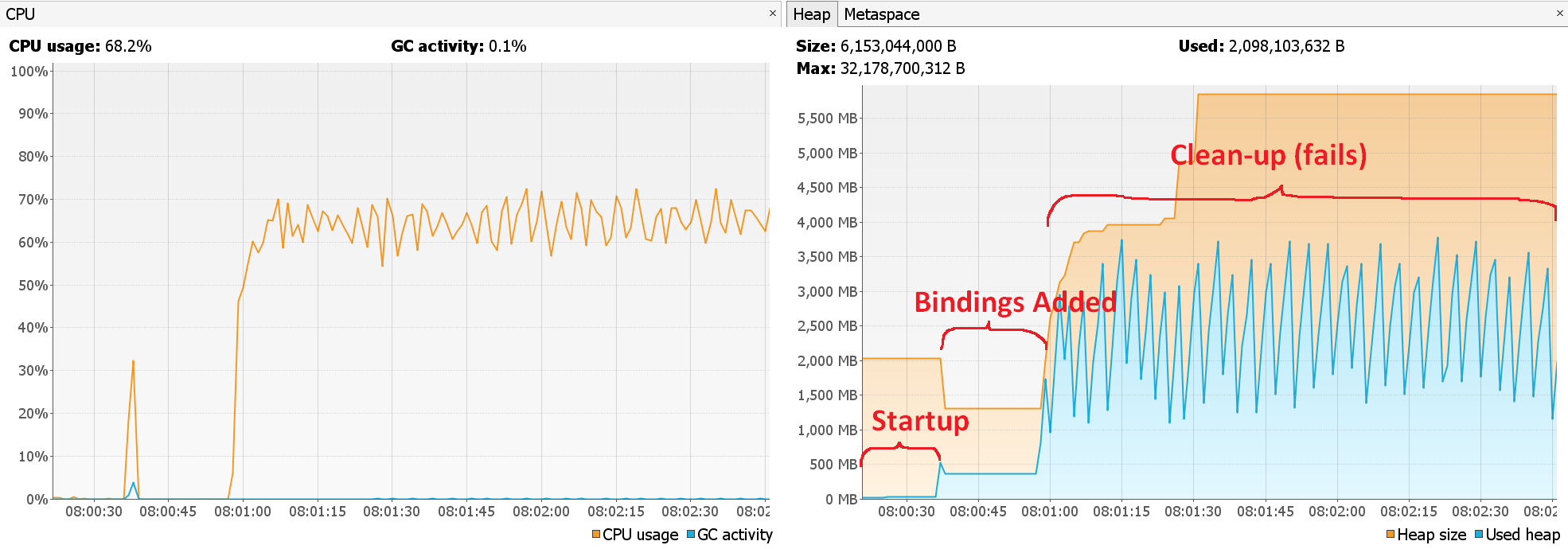RFR: 8274771: Map, FlatMap and OrElse fluent bindings for ObservableValue [v18]
John Hendrikx
jhendrikx at openjdk.org
Fri Jul 8 10:20:15 UTC 2022
On Fri, 1 Jul 2022 15:16:24 GMT, John Hendrikx <jhendrikx at openjdk.org> wrote:
>> This is an implementation of the proposal in https://bugs.openjdk.java.net/browse/JDK-8274771 that me and Nir Lisker (@nlisker) have been working on. It's a complete implementation including good test coverage.
>>
>> This was based on https://github.com/openjdk/jfx/pull/434 but with a smaller API footprint. Compared to the PoC this is lacking public API for subscriptions, and does not include `orElseGet` or the `conditionOn` conditional mapping.
>>
>> **Flexible Mappings**
>> Map the contents of a property any way you like with `map`, or map nested properties with `flatMap`.
>>
>> **Lazy**
>> The bindings created are lazy, which means they are always _invalid_ when not themselves observed. This allows for easier garbage collection (once the last observer is removed, a chain of bindings will stop observing their parents) and less listener management when dealing with nested properties. Furthermore, this allows inclusion of such bindings in classes such as `Node` without listeners being created when the binding itself is not used (this would allow for the inclusion of a `treeShowingProperty` in `Node` without creating excessive listeners, see this fix I did in an earlier PR: https://github.com/openjdk/jfx/pull/185)
>>
>> **Null Safe**
>> The `map` and `flatMap` methods are skipped, similar to `java.util.Optional` when the value they would be mapping is `null`. This makes mapping nested properties with `flatMap` trivial as the `null` case does not need to be taken into account in a chain like this: `node.sceneProperty().flatMap(Scene::windowProperty).flatMap(Window::showingProperty)`. Instead a default can be provided with `orElse`.
>>
>> Some examples:
>>
>> void mapProperty() {
>> // Standard JavaFX:
>> label.textProperty().bind(Bindings.createStringBinding(() -> text.getValueSafe().toUpperCase(), text));
>>
>> // Fluent: much more compact, no need to handle null
>> label.textProperty().bind(text.map(String::toUpperCase));
>> }
>>
>> void calculateCharactersLeft() {
>> // Standard JavaFX:
>> label.textProperty().bind(text.length().negate().add(100).asString().concat(" characters left"));
>>
>> // Fluent: slightly more compact and more clear (no negate needed)
>> label.textProperty().bind(text.orElse("").map(v -> 100 - v.length() + " characters left"));
>> }
>>
>> void mapNestedValue() {
>> // Standard JavaFX:
>> label.textProperty().bind(Bindings.createStringBinding(
>> () -> employee.get() == null ? ""
>> : employee.get().getCompany() == null ? ""
>> : employee.get().getCompany().getName(),
>> employee
>> ));
>>
>> // Standard JavaFX + Optional:
>> label.textProperty().bind(Bindings.createStringBinding(
>> () -> Optinal.ofNullable(employee.get())
>> .map(Employee::getCompany)
>> .map(Company::getName)
>> .orElse(""),
>> employee
>> ));
>>
>> // Fluent: no need to handle nulls everywhere
>> label.textProperty().bind(
>> employee.map(Employee::getCompany)
>> .map(Company::getName)
>> .orElse("")
>> );
>> }
>>
>> void mapNestedProperty() {
>> // Standard JavaFX:
>> label.textProperty().bind(
>> Bindings.when(Bindings.selectBoolean(label.sceneProperty(), "window", "showing"))
>> .then("Visible")
>> .otherwise("Not Visible")
>> );
>>
>> // Fluent: type safe
>> label.textProperty().bind(label.sceneProperty()
>> .flatMap(Scene::windowProperty)
>> .flatMap(Window::showingProperty)
>> .orElse(false)
>> .map(showing -> showing ? "Visible" : "Not Visible")
>> );
>> }
>>
>> Note that this is based on ideas in ReactFX and my own experiments in https://github.com/hjohn/hs.jfx.eventstream. I've come to the conclusion that this is much better directly integrated into JavaFX, and I'm hoping this proof of concept will be able to move such an effort forward.
>
> John Hendrikx has updated the pull request with a new target base due to a merge or a rebase. The incremental webrev excludes the unrelated changes brought in by the merge/rebase. The pull request contains 27 additional commits since the last revision:
>
> - Merge branch 'openjdk:master' into feature/fluent-bindings
> - Add null checks in Subscription
> - Update copyrights
> - Move private binding classes to com.sun.javafx.binding package
> - Add note to Bindings#select to consider ObservableValue#flatMap
> - Fix bug invalidation bug in FlatMappedBinding
>
> Also fixed a secondary issue where the indirect source of the binding
> was unsubscribed and resubscribed each time its value was recomputed.
>
> Add additional comments to clarify how FlatMappedBinding works.
>
> Added test cases for these newly discovered issues.
> - Fix typos in LazyObjectBinding
> - Rename observeInputs to observeSources
> - Expand flatMap javadoc with additional wording from Optional#flatMap
> - Add since tags to all new API
> - ... and 17 more: https://git.openjdk.org/jfx/compare/d9654f5e...d66f2ba6
Remember this program? :)
> ```
> // Sample program that shows stub leakage:
> public static void main(String[] args) throws InterruptedException {
> StringProperty x = new SimpleStringProperty();
>
> // Startup
> Thread.sleep(20000);
>
> for(int i = 0; i < 10000000; i++) {
> new SimpleStringProperty().bind(x);
> }
>
> // Bindings added
> System.gc(); // 400 MB of uncollectable stubs does not get GC'd
> Thread.sleep(20000);
>
> // Triggers "stub" clean-up (which fails miserably because of lots of array copying)
> x.set("A");
>
> System.gc();
> Thread.sleep(20000);
> }
> ```
>
> 
I modified `ExpressionHelper` to use a custom `Collection` class that has `O(log N)` performance for the only things it uses (add at end, remove a specific listener, iteration). It has the exact same characteristics as `ArrayList`, that is, it is ordered, it allows duplicates and it maintains the exact positions when duplicates are part of the list, which means the call order of listeners is exactly the same (a `LinkedHashMap<Listener, counter>` would not have this characteristic). Furthermore, it is very similar to an `ArrayList`, which means relatively low overhead (there is no `Entry` wrapper for each item in the "list") and good cache locality when iterating.
Performance looks now like this:

The price for this is increased memory use (you can see that having 10.000.000 binding stubs took around 400 MB before, and now it takes about twice that). The extra memory use is only paid when there is more than 1 listener (as per how `ExpressionHelper` operates).
-------------
PR: https://git.openjdk.org/jfx/pull/675
More information about the openjfx-dev
mailing list